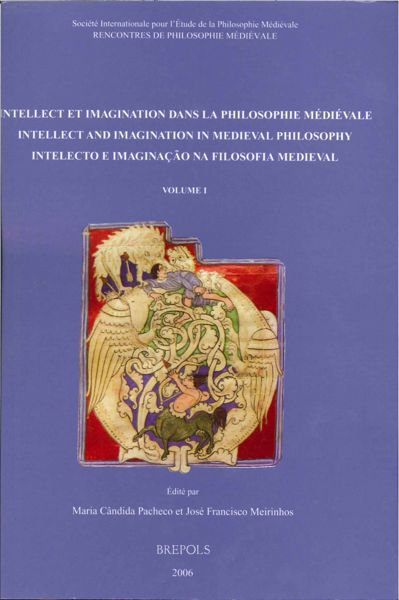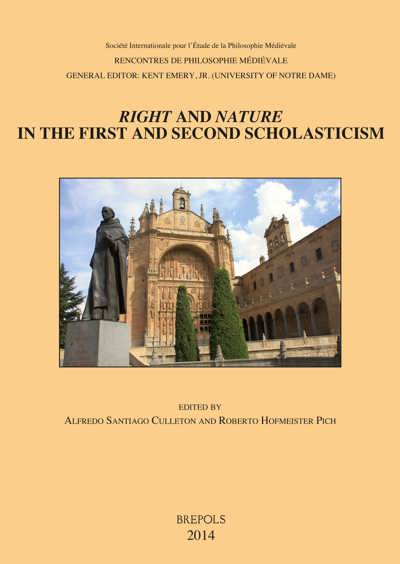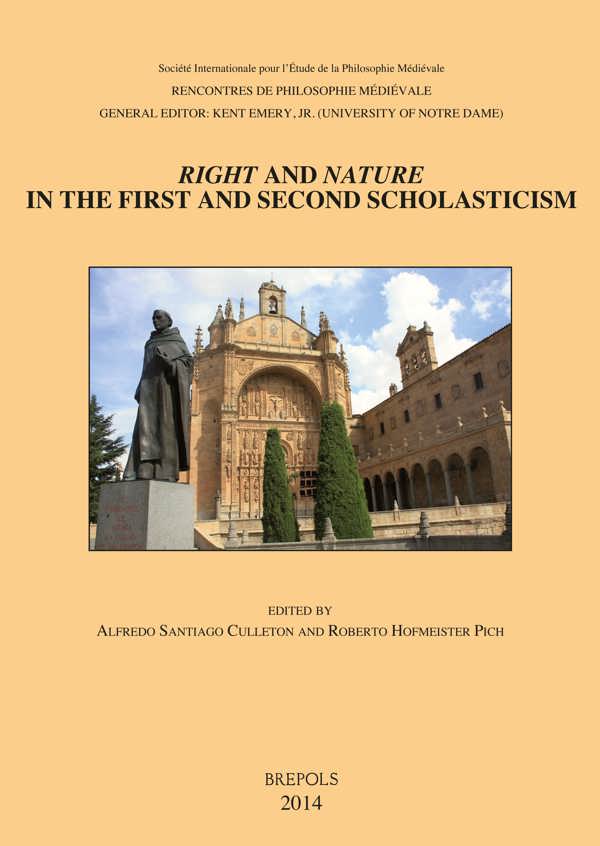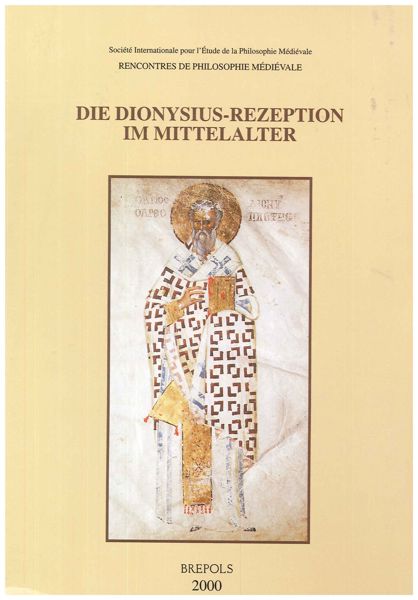
Right and Nature in the First and Second Scholasticism. Derecho y Naturaleza en la primera y segunda escolástica
Acts of the XVIIth Annual Colloquium of the Société Internationale pour l'Etude de la Philosophie Médiévale, Porto Alegre, Brazil, 15-18 September 2010
Roberto Hofmeister Pich, Alfredo Santiago Culleton (eds)
- Pages: 476 p.
- Size:156 x 234 mm
- Language(s):English, Spanish
- Publication Year:2015
- € 85,00 EXCL. VAT RETAIL PRICE
- ISBN: 978-2-503-55458-7
- Paperback
- Available
- € 85,00 EXCL. VAT RETAIL PRICE
- ISBN: 978-2-503-55484-6
- E-book
- Available
This volume focuses on the reception and development of Aristotelian-Thomistic and (to a lesser extent) Scotistic political theory, natural law, positive law and the law of nations in the sixteenth and seventeenth centuries.
"(...) a substantial and altogether captivating book. Comprehensive yet detailed, this collection of essays is an admirable addition to the history of Scholasticism and a hopeful promise of forthcoming works that will similarly bridge the gap of periodization between the medieval and early modern periods, as well as the disciplinary divides between intellectual, political, and religious histories." (George A. Klaeren, in: Journal of Jesuit Studies 3, 2016, p. 308-310)
Roberto Hofmeister Pich: PhD. in Philosophy, July 2001, at the University of Bonn / Germany, advised by Prof. Dr. Ludger Honnefelder (title of the thesis: Der Begriff der wissenschaftlichen Erkenntnis nach Johannes Duns Scotus); since 2001 Professor of Philosophy at the Graduate Program in Philosophy of the Pontifícia Universidade Católica do Rio Grande do Sul (PUCRS); Alfredo Santiago Culleton: PhD. in Philosophy, 2003, at the Pontifical Catholic University of Rio Grande do Sul (Porto Alegre / Brazil); Full Professor of Philosophy at the Universidade do Vale do Rio dos Sinos;
Authors of the ‘Second Scholasticism’ (as discussed in this volume, at least, mainly Iberian philosophers and theologians of the sixteenth and seventeenth centuries) not only commented on the works and updated the teachings of medieval Scholastic masters but also introduced many new ideas in all areas of philosophy, namely logic, natural philosophy, metaphysics, moral philosophy, political philosophy and the philosophy of law. In particular, issues arising from the “discovery” of the New World presented new challenges to these thinkers, provoking various reactions among them and causing them to develop new interpretations and theories especially in practical philosophy and theology. In this volume, scholars from Europe, North America and South America identify and describe some of the main topics and central lines of thinking in this still quite unknown chapter in the history of philosophical ideas. The contributors focus on the reception and development of Aristotelian-Thomistic and (to a lesser extent) Scotistic political theory, natural law, positive law, and law of nations in the sixteenth and seventeenth centuries; some authors, moreover, address issues in the development of metaphysics during the same period. For the most part, the studies presented here concern the writings and thought of masters from the Universities of Salamanca, Alcalá, Évora and Coimbra, who responded to questions and conceived new theories in political philosophy, law and moral philosophy closely related to the issues pertaining to the Spanish and Portuguese colonies in the New World.
Acknowledgements
Roberto H. PICH, An Index of ‘Second Scholastic’ Authors
Ludger HONNEFELDER, Natural Law as the Principle of Practical Reason: Thomas Aquinas’ Legacy in the Second Scholasticism
Pedro ROCHE ARNAS, El anónimo Quaestio in utramque partem sobre la autonomía del poder real in temporalibus
Alessandro GHISALBERTI, Legge naturale e fondazione dell’Etica in Guglielmo di Ockham
José Luis FUERTES HERREROS, El discurso de los saberes en la segunda escolástica
Marco TOSTE, Unjust Laws and Moral Obligation in the Sixteenth-Century Salamancan Commentaries on Thomas Aquinas’ De legibus
Ángel PONCELA GONZÁLEZ, Filosofía del derecho en sentido pragmático: Francisco de Vitoria y la escuela de Salamanca
Paula OLIVEIRA E SILVA, The Sixteenth-Century Debate on the Thomistic Notion of the Law of Nations in Some Iberian Commentaries on the Summa theologiae IIaIIae q.57 a.3: Contradiction or Paradigm Shift?
António MARTINS, Natural Law and the Law of Nations: A Case Study
Giuseppe TOSI, Sins Against Nature as Reasons For a “Just War”: Sepúlveda, Vitoria and Las Casas
Jörg Alejandro TELLKAMP, Francisco de Vitoria and Luis de Molina on the Origin of Political Power
Roberto H. PICH, Revisiting the Topic of the “Law of War”: The Comments on Thomas Aquinas’ Summa theologiae IIaIIae q.40 aa.1-4 by Fernando Perez (16th Century)
Laura CORSO DE ESTRADA, Tesis helenísticas en exégesis escolásticas: “Conformidad con la naturaleza” Alberto Magno, Tomás de Aquino y Domingo de Soto
Manuel LÁZARO PULIDO, La ley natural en Alfonso de Castro, OFM
Alfredo S. CULLETON, Mutability and Immutability of the ius gentium according to Suárez
Francisco BERTELLONI, Francisco Suárez, crítico del monismo de Marsilio de Padua
Giannina BURLANDO, Defensas históricas del poder político: F. Suárez y J. Locke teóricos de la moralidad por el acuerdo
Luis Alberto DE BONI, Grotius and Scholasticism
Alfredo STORCK, Molina in a Spanish Treatise against Machiavelli
Celina A. LÉRTORA MENDOZA, El tratado De iure y sus migraciones sistemáticas en la escolástica (siglos XIII a XX)
Marco FORLIVESI, Filippo Fabri (1564-1630) on the Nature of Metaphysics: A Paduan Scotistic-Aristotelian Counter-Attack on Rival Doctrinal Traditions
Jorge J.E. GRACIA y Daniel D. NOVOTNÝ, Trascendentales y categorías en la metafísica de Suárez
Index of Manuscripts
Index of Ancient and Medieval Names
Index of ‘Second Scholastic’ Authors
Index of Modern and Contemporary Authors




